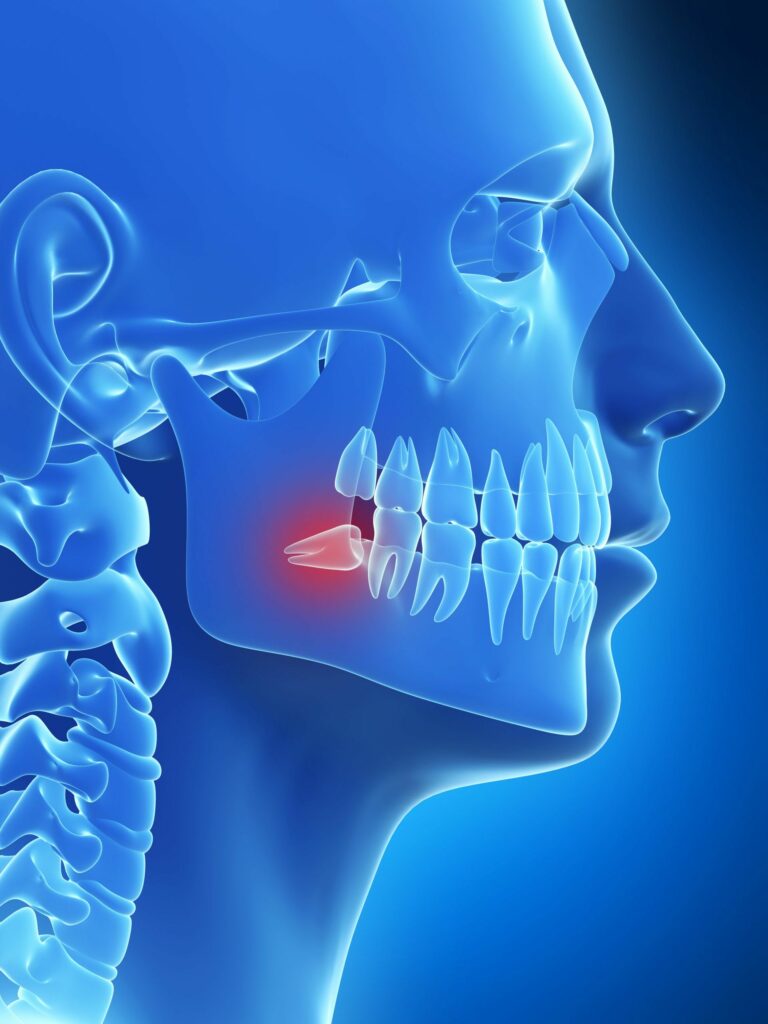Experienced Wisdom Tooth Removal Near Chicago, IL
At NorthShore Center for Oral & Facial Surgery and Implantology, we understand that wisdom tooth removal can be daunting. Our team of experienced oral surgeons near Chicago, IL, is dedicated to providing a comfortable and stress-free experience for patients in Lake and Cook County.
We believe every patient deserves personalized care. Our approach to wisdom tooth removal is tailored to your specific needs, ensuring a safe and effective procedure. We use the latest techniques and technology to minimize discomfort and promote a speedy recovery. Call 847-623-5915 to learn more.

Wisdom teeth are the last teeth to erupt within the mouth. When they align properly and gum tissue is healthy, wisdom teeth do not have to be removed. Unfortunately, this does not generally happen.
The pressure from the erupting wisdom teeth may move other teeth and disrupt the orthodontic or natural alignment of teeth. Early removal is recommended to avoid such future problems and to decrease the surgical risk involved with the procedure.
If you’re experiencing any of the following symptoms, it may be a sign that you need wisdom tooth removal:
- Pain or Swelling: This is a common symptom of wisdom tooth problems, especially when the teeth are impacted or infected.
- Jaw Pain: If your wisdom teeth are causing your jaw to ache or feel sore, it’s a sign that they may need to be removed.
- Difficulty Opening Your Mouth: Impacted wisdom teeth can make it difficult to open your mouth wide.
- Bad Breath or Taste: Infection around wisdom teeth can cause bad breath or a foul taste in your mouth.
- Gum Disease: Wisdom teeth can be difficult to clean, which can lead to gum disease.
At NorthShore Oral & Facial Surgery (NSOFS), our experienced oral surgery team offer comprehensive wisdom tooth evaluations for patients in Lake and Cook County. Through a combination of oral examinations and X-rays, we can accurately assess the position of your wisdom teeth and identify potential problems.
Early Detection for Optimal Results
Studies have shown that early evaluation and treatment of an impacted wisdom tooth can significantly improve patient outcomes. We recommend that patients begin monitoring their wisdom teeth in their mid-teens. Your dentist or oral surgeon can provide a thorough evaluation.
Safe and Comfortable Surgical Procedure
All wisdom tooth removal procedures at NSOFS are performed in an outpatient setting under appropriate anesthesia. Our skilled surgeons offer anesthesia options to ensure your comfort and safety throughout the process. If you have any questions, please do not hesitate to call us at (847) 623-5915.
Candidacy for Wisdom Tooth Removal
Whether or not you are a candidate for wisdom tooth removal will depend on several factors, including:
- The position of your wisdom teeth: If your wisdom teeth are impacted or causing problems, you may be a candidate for removal.
- Your oral health: If you have other dental problems, such as gum disease or cavities, your dentist may recommend delaying wisdom tooth removal until these issues are addressed.
- Your age: While wisdom tooth removal can be performed at any age, it is often recommended for young adults to avoid potential complications later in life.
The Wisdom Tooth Removal Process
At NorthShore Oral & Facial Surgery (NSOFS), our experienced oral surgeons specialize in safe and efficient wisdom tooth removal procedures. The process typically involves the following steps:
- Anesthesia: Before the procedure begins, you will be administered anesthesia to ensure your comfort. We offer a variety of options, including local anesthesia, sedation, and general anesthesia.
- Tooth Extraction: Once you are numb, our surgeon will carefully remove the wisdom tooth. In some cases, the tooth may need to be sectioned or extracted in pieces.
- Suturing: After the tooth is removed, the surgeon will suture the extraction site to control bleeding and promote healing.
Aftercare for the Removal of Wisdom Teeth
Proper aftercare is essential for a smooth recovery. Here are some important guidelines to follow:
- Rest: Avoid strenuous activity for the first few days after the procedure.
- Ice: Apply ice packs to your face to reduce swelling and pain.
- Medication: Take any prescribed pain medication as directed.
- Diet: Follow a soft diet for the first few days to avoid irritating the extraction site.
- Oral hygiene: Brush and floss your teeth gently, avoiding the extraction site.
- Avoid smoking and alcohol: These can interfere with healing and increase the risk of infection.
Frequently Asked Questions
If you choose not to have your wisdom teeth removed, there are several potential risks:
- Pain and discomfort: Impacted or partially erupted wisdom teeth can cause significant pain and discomfort.
- Infection: Wisdom teeth can become infected, leading to swelling, redness, and pus.
- Cysts: Cysts can form around impacted wisdom teeth, potentially damaging nearby teeth or causing other problems.
- Crowding: Wisdom teeth can crowd other teeth, leading to misalignment and orthodontic issues.
Whether or not your insurance covers the cost of wisdom tooth removal depends on your specific insurance plan. Many dental insurance plans cover a portion of the cost, but there may be limitations or deductibles. It’s important to review your insurance coverage carefully to determine your out-of-pocket costs.
If your wisdom teeth are causing pain, swelling, or other problems, it may be time to have them removed. Your dentist can assess your situation and recommend the best course of action.
While wisdom tooth removal may be uncomfortable, our team will take steps to minimize pain and discomfort. We offer a variety of pain management options, including anesthesia and sedation.

